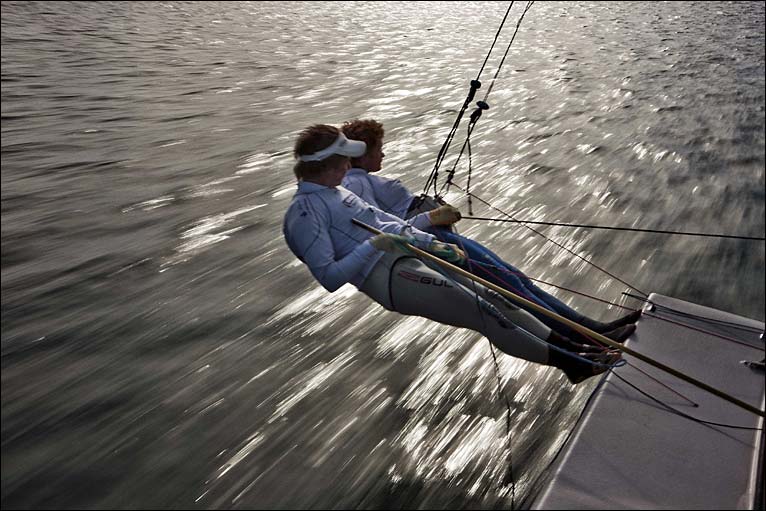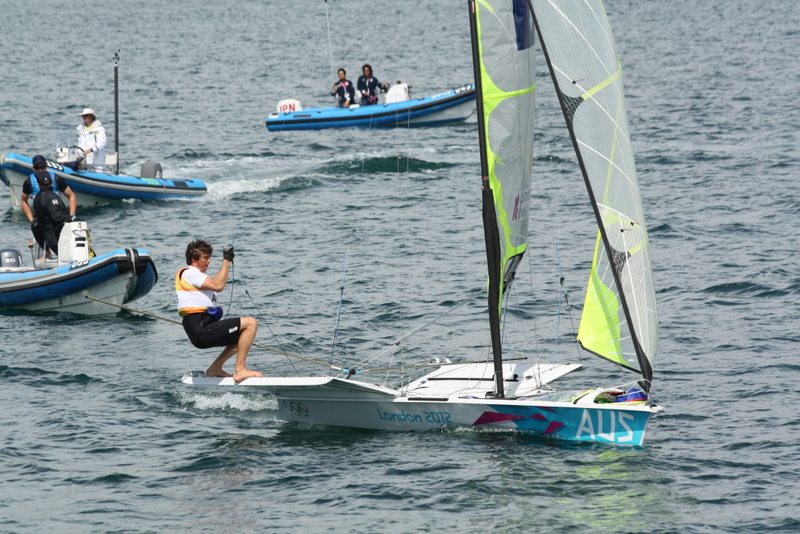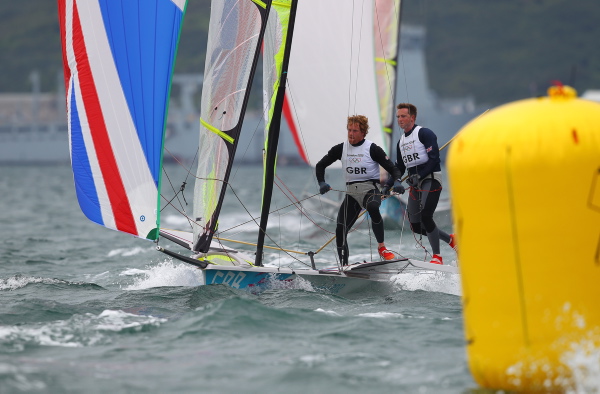SailJuice: Talking of precious metals and things like that, I read
recently that you say you got bored of bronze. Too much bronze, not enough
golds. What are you going to do to smuggle your way to gold, get past those
Aussies, for example?
Stevie: Bronze is a nice thing to get bored of. Certainly that was a
very hopeful statement when I said that, but yeah, it would be nice to be
starting to win things a little bit more. It was nice in Holland to win and as
you said to beat Nathan and Gooby was a great thing. I think there’s areas in
the tuning we’ve made a massive leap forward but now we’ve got a new boat, new
foils, new mast, new sails. Pretty much the only things that are original are
Ben and me. There’s fine tuning to be done in that so we’ve got a lot of work
to do and we can now go away knowing we’ve got a really good, solid base. We’ve
got solid kit. We’ve got a lot better understanding of how the rig’s working,
and we’ve had some really good input from obviously our coach Barker, but from
Bart Simpson, he’s taken a real interest since Palma, and been really helpful
in looking at the rig and kind of chatting with us on how you work though that.
Obviously in the starts there’s an awful lot to work through, so
he’s been really helpful and guys like Derek Clark – we’ve been able to have a
chat with them and get more input. So just kind of going a bit outside of our
group and getting new ideas from people. In Britain we’ve got such a pool of
people that are good at making boats go fast, and I think just Ben, myself and
Ian can sometimes – there’s only three people’s worth of ideas. So we’ve got to
look to go outside the box a little bit and get new ideas from new people, and
also just working hard on the tuning side of things. Our understanding of the
masts and the sails is a lot better, our basic commitment to – does it feel
right, is the load on the helm right – is the boat balanced – is a lot more
critical, we’re a lot more willing to try things and as most people know, if
the boat’s not balanced it won’t go quick. It sounds very basic but when you go the
sailing all the time and you do hours and hours of sailing it’s quite easy to
sort of burrow off down a slightly wrong tunnel.
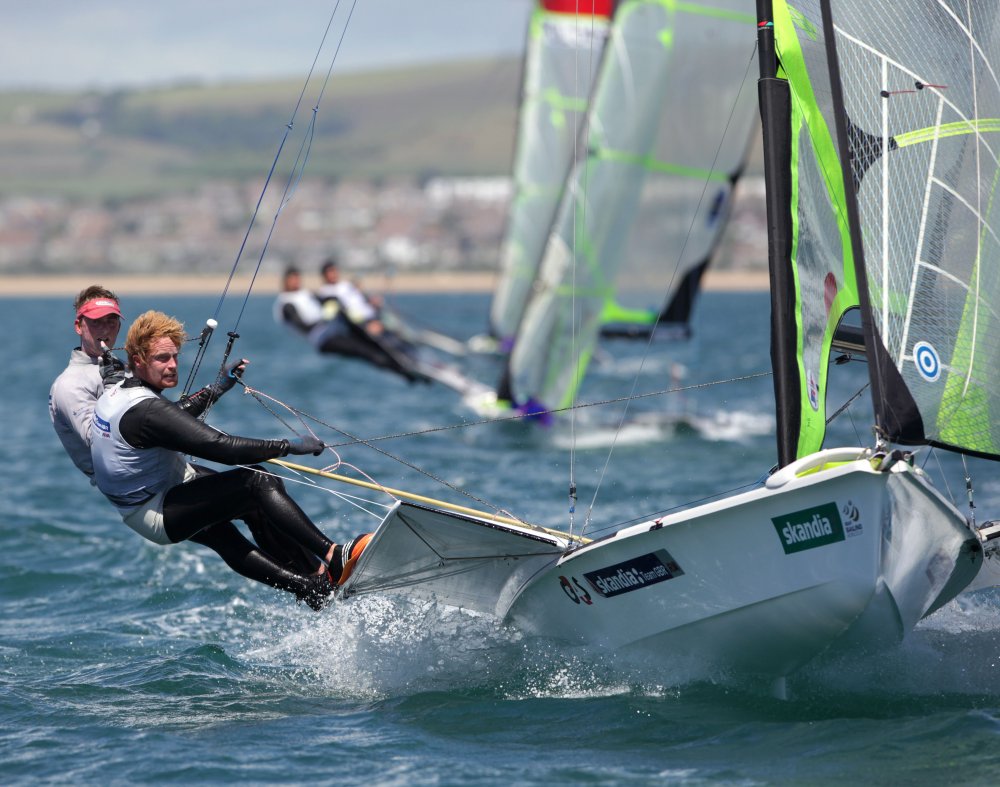
SailJuice: The whole dynamic of having six boats, maybe it’s more, but
sort of six that I’m aware of in the British squad all capable of getting on
the podium at some point in the ISAF year. Does that make it easier or make it
harder to get where you need to get in order to be positioned to win a medal at
the Olympics?
Stevie: I don’t know really. On the surface it should make it easier
in that you’ve got a bigger pool of talent, bigger pool of knowledge. I think
we’re a pretty good squad in terms of the situation everyone’s in and regarding
how much we talk to each other and how much you share and understand, it’s
pretty good. There’s got to be, I’m sure, an element of caginess because
everyone’s after the same prize at the end of it, and so maybe that’s not all
the knowledge is out there on the table, I think most of it is.
But the trouble you have is guys like yourself, no offence, and
other journalists and Sparky and everyone, they’re looking at you at every
event, so every event kind of people judge – we’ve had a couple of good ones
and obviously now we look super popular and really good. But to be fair to
Dylan, early in the year he was sailing really well, certainly in the light
breezes anyway, he’s definitely quite a lighter specialist, and I think you
feel like you’ve kind of got to jump for a hoop at every event, which doesn’t
really allow you to go away and try too many new things.
Obviously Nathan is pushed by the Australians but not so much I
would argue. They’ve got some guys that are very quick, the Philips brothers
are very fast, and a few of the other younger Aussies that are quick and Nathan
can train with them, but I expect he’s relatively confident that he’s going to
be able to ultimately get a selection certainly for this Olympics. But that
allows him to kind of go away to sail other boats, to try new things and to do
it fairly relaxed, whereas we always know in a couple of weeks you’ve got to do
well at an event which doesn’t allow you to stray too far from your kind of
basic ideas.
So there’s definitely a downside to it in that you are all going
for the same point and you are being judged so often. It’s obviously very easy
for me to say because we’ve done well, but last year two events we did well
were the Europeans and Sail for Gold, and again Sail for Gold last year, doing
well in Weymouth’s been our target, so not too fussed about doing well in here.
Obviously you’d like to do well everywhere, but we are trying to make sure we
focus on those events in Weymouth and so far it’s been going alright in
Weymouth, but you’ve got to be quite mentally tough to kind of deal with the
not doing so well in other places, to try and move forward. Whereas Nathan just
doesn’t come to anywhere unless he’s going to race, and he’s doing that work at
home – I know he’s a pretty calm, casual guy but he works blooming’ hard and he
says oh yeah, haven’t raced a 49er for a long time, certainly sailed a 49er
plenty, and he’s putting that training in and working through all the tuning
and being able to do that so that when he comes into an event he’s tried new
things and worked through it, whereas we’re kind of having to constantly race a
little bit more, which has it’s plusses but has a downside.
SailJuice: And now you’ve got this opportunity that no other British team
does, you’re going to the Olympic test event. What are your goals for that test
regatta in August?
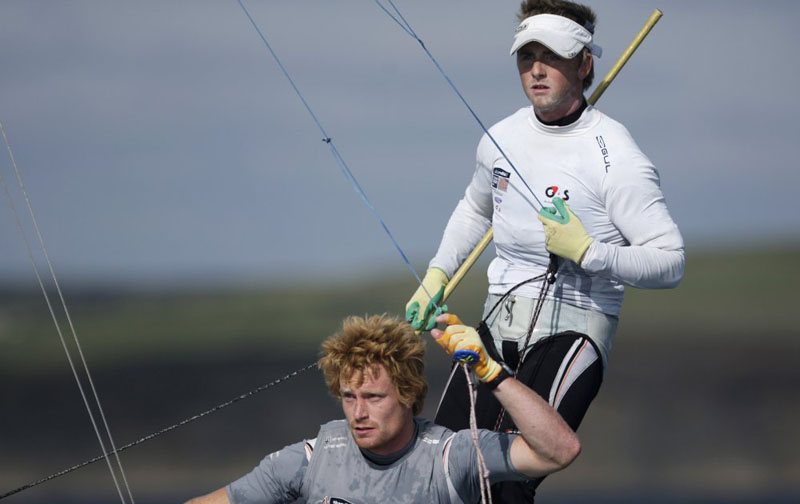
GBR 49er Team - Stevie Morrison and Ben Rhodes
Stevie: Our main goal is obviously to win another medal, I think it will interesting – without being too kind of negative on the whole British thing, but it was quite nice in Holland. There was only us and Dave from Britain there, so you kind of don’t always have the feel – oh, there’s the British guy, is he going to tack left, it’s going to make it hard for us, you know, and it’s obviously a fine racing position for him, but that whole British element I’m sure doesn’t really help, so it will be nice to get there and look to more than medal, to really challenge Nathan. I mean, last week we were pretty good, and I think we could have perhaps challenged him harder, I mean obviously we got a black flag in the first race, which was doughnut move number one, so I think we’re closer to Nathan than perhaps that result in Weymouth showed, in that we made the week blooming’ hard for ourselves as if there wasn’t enough pressure already to get a black flag in the first race wasn’t very good.
SailJuice: That was a good come back. You must be pleased with
yourselves. You created more of a test for yourself than you needed to, but to
have come through it, that must have strengthened the character.
Stevie: Yeah, I think so. I think Ben and I were probably as proud of
that as anything I think, we didn’t sort of sail as well as we can, because
obviously a) there was the pressure of the whole British thing and trying to
qualify for the test event, but also getting a black flag means you’re looking
over your shoulder at quite a lot of points potentially going to hit you. It
makes it hard, and I think that was one of the things Ben and I were probably
proudest of really at the event, because maybe a few years ago we would have
had another bad day or had another real clanger or two in there and that would
have sort of done it for us, whereas we stayed pretty tight and we sailed
pretty consistently from then on through and got the result, which was obviously
fantastic.
SailJuice: The other thing that jumped out at me when I saw the list of
those going to the test event in August is that it’s about as close as you
could get with the existing sailors we have still racing, to the Olympic
line-up for 2008. It’s not Luke Patience and Stuart Bithell in the 470, the
young up and comers, it’s Nick Rogers the double silver medalist with his new
crew Chris Grube and it’s not Dylan and Allan in the 49er, it’s Stevie Morrison
and Ben Rhodes. It seems like a lot of the old garter are coming good when it
matters most, what’s your take on that?
Stevie: Yeah, it’s quite interesting. Certainly to look at it like
that, obviously Nick Thompson looked pretty good on Goodie till quite near the
end of the regatta as well. It’s still
the class of Jim Saltonstall that’s still doing it, so perhaps that whole
philosophy of Jim’s suits you pretty well when it gets to a big event. But
yeah, I think obviously sailing’s an experience-based sport and once you’ve
been to Olympics that’s where you sort of really get to experience pressure and
Sparky will tell you, you look at the stats, it tends to be people that have
been to more than one Olympics that win medals.
So obviously that experience of going to the Olympics does stand you in good stead for the big events. It’s certainly interesting to look at, you’ll have to ask a psychologist really on that one, Ricey, it’s not one for me. We’re obviously really pleased and I was really pleased for Nick and Chris, they as you know worked very hard and they’ve done an awful lot in not a lot of time, but equally you look at Luke and Stu and in that last comment you’ve not even mentioned Nick Asher and Elliot Willis. Top world champions, you know, so with all the classes there’s an awful long way to go until we’ve all got our tracksuits, but yeah, it’s interesting how it works out, maybe you need to get onto the phone to a psychologist Ricey and do a little interview on that one!
or download the interview to your desktop by clicking the link below....
CLICK HERE TO DOWNLOAD STEVIE MORRISON INTERVIEW...
If you're an iTunes user, you can subscribe to Sailing Talk here..
.

